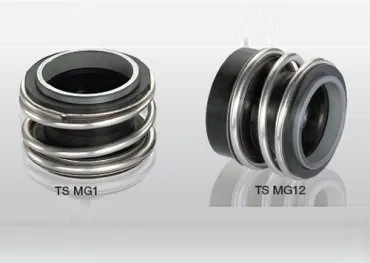A Complete Guide to Pump Seals: Compatibility, Types, and Maintenance Tips
Jul 22, 2025
Pump seals are a critical component in any fluid-handling system, ensuring leakage control, system reliability, and equipment longevity. Whether you're working with water, chemicals, or slurries, the right seal can mean the difference between a smoothly running system and costly downtime.
This comprehensive guide breaks down the different types of pump seals, the difference between standard and machined versions, brand-specific seal compatibility, and tips for maintaining seal performance over time.
What Are Mechanical and Pump Seals?
A pump seal—also referred to as a mechanical seal—is a device that helps join systems or mechanisms together by preventing leakage, containing pressure, or excluding contamination. In pumping systems, mechanical seals are placed between the pump housing and the rotating shaft to contain the fluid inside the pump and prevent it from leaking into the environment.
There are two broad categories of seals commonly used in pumps:
- Mechanical Seals: These consist of rotating and stationary elements and are designed to prevent fluid from escaping between the pump casing and the shaft.
- Gland Packing or Soft Packing: An older, less efficient method involving braided material compressed in a stuffing box to restrict fluid flow.
Mechanical seals offer superior efficiency, reduced wear and tear, and better environmental protection compared to traditional packing.
Standard vs. Machined Seals: What’s the Difference?
One major distinction in pump sealing solutions is between standard seals and machined seals. Choosing the right type depends on your pump’s application, fluid type, temperature, and pressure requirements.
Standard Seals
Standard mechanical seals are mass-produced, often designed to fit commonly used pump models. They are easy to replace and cost-effective for general applications.
Advantages:
- Easily available
- Quick to install
- Cost-effective for low-risk systems
Limitations:
- May not fit custom or older equipment perfectly
- Limited customization for extreme conditions
Machined Seals
A machined seal is customized or precision-engineered for specific pump systems, often used when standard seals are incompatible due to unique system requirements or operating conditions.
Advantages:
- Tailored fit for specific equipment
- Better performance under high pressure or temperature
- Reduced risk of failure due to perfect compatibility
Limitations:
- Higher upfront cost
- Slightly longer lead time for manufacturing
Machined seals are ideal for specialized or high-demand applications where sealing integrity is critical.
Brand-Specific Pump Seal Solutions
Different pump manufacturers require seals that meet their unique design specifications. Using the wrong seal can lead to performance issues, fluid leaks, and equipment damage.
Lowara Pump Seal
Lowara pumps are widely used in water supply and HVAC applications. A Lowara pump seal must match the pump's unique shaft size and operating environment. When selecting a seal for Lowara systems, pay close attention to the mechanical dimensions and material compatibility.
Flygt Pump Seal
Flygt pumps, typically used for wastewater and drainage, operate in aggressive media. A Flygt pump seal is designed to handle abrasives, solids, and chemical exposure. Dual mechanical seals and robust materials are often preferred for this application.
APV Pump Seal
APV pumps are common in food and beverage processing. Hygiene and cleanability are top priorities. An APV pump seal must be FDA-compliant and capable of withstanding frequent cleaning cycles without degrading.
Ebara Pump
Ebara pumps are known for their stainless-steel construction and are widely used in industrial and commercial settings. When choosing a seal for an Ebara pump, ensure compatibility with both the material and pressure ratings. Seals made from carbon, silicon carbide, and elastomers like Viton are often suitable for Ebara applications.
How to Choose the Right Pump Seal
Selecting the right seal requires more than matching size—it’s about system compatibility, media resistance, and long-term reliability.
Key Factors to Consider:
- Fluid Type: Corrosive fluids may require seals made of specific alloys or elastomers.
- Temperature & Pressure: High temperature or pressure conditions require stronger sealing materials.
- Shaft Size and Speed: Ensure the seal matches the exact specifications to avoid vibration or leakage.
- Environment: Outdoor or submerged pumps need seals that resist dust, moisture, or chemicals.
- Industry Standards: For regulated industries like food or pharmaceuticals, seals must meet sanitary requirements.
Maintenance Tips to Extend Seal Life
Pump seals are subject to wear over time. Regular maintenance helps you avoid premature failure and extend the life of your system.
Best Practices for Seal Longevity:
- Inspect Seals Regularly: Look for signs of wear, leakage, or unusual noise.
- Use the Right Lubricants: Improper lubrication can cause overheating and early failure.
- Ensure Proper Installation: Misalignment or improper torque can reduce seal effectiveness.
- Flush Systems Clean: In abrasive or high-solid environments, use flushing to reduce buildup.
- Avoid Dry Running: Running a pump without fluid can cause immediate seal damage.
- Replace Elastomers During Maintenance: Seals include rubber parts that degrade over time even if the main faces are intact.
Final Thoughts
Pump seals play a crucial role in maintaining system efficiency, safety, and reliability. From choosing between a standard or machined seal to selecting a seal compatible with your Lowara, Flygt, APV, or Ebara pump, the right decision depends on your application and operating conditions.
Understanding your pump’s requirements, monitoring for wear, and following best practices will not only extend the lifespan of your seals but also reduce downtime and maintenance costs. Whether you're managing a small HVAC system or a large industrial fluid process, investing in the correct seal solution is key to performance and peace of mind.
Recent Posts

October 26, 2016
The Most Successful Engineering Contractor

